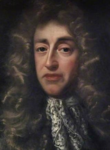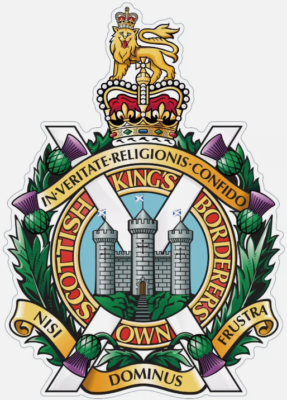The origin of the King’s Own Scottish Borderers (KOSB) was the raising of an infantry regiment in 1689 to defend Edinburgh against possible attack by Jacobite supporters of the deposed King James VII of Scotland (also formerly King James II of England and Ireland).

It was based in York from 1873 and in Berwick-upon-Tweed from 1881, and amalgamated with other regiments in 2006.
The KOSB insignia featured a stylised Edinburgh castle and the city’s motto ‘Nisi Dominus Frustra’: ‘Without the Lord, it is in vain’. ‘King’s Own’ refers to the accordance of royal status by King George III in 1805. The large white ‘X’ is the cross of St Andrew, Scotland’s patron saint, and the surrounding wreath of thistles also indicates the regiment’s Scottish heritage. The lion and St Edward’s crown are the royal crest of England, retained despite some objections, and referred to colloquially as the ‘dog and bonnet’ [hat].

The KOSB started 1915 with five battalions and ended with eight after an enthusiastic response to Kitchener’s recruitment campaign. Battalions could have up to three ‘lines’: 1st lines were front line units; 2nd lines served in the UK; 3rd lines were stationed at battalion barracks.
| Battalion | Line | 1914-1915 Locations |
|---|---|---|
| 1st | India, Rugby, Gallipoli | |
| 2nd | France and Flanders | |
| 3rd (Reserve) | Dorset, Edinburgh | |
| 4th (Border) | 1st | Galashiels, Stirling, Gallipoli |
| 2nd | Galashiels, Hawick | |
| 3rd | Galashiels | |
| 5th (Dumfries and Galloway) | 1st | Dumfries, Stirling, Gallipoli |
| 2nd | Dumfries, Perthshire, Falkirk | |
| 3rd | Dumfries | |
| 6th (Service) [New Army] | Berwick-upon-Tweed, France | |
| 7th (Service) [New Army] | Berwick-upon-Tweed, France | |
| 8th (Service) [New Army] | Berwick-upon-Tweed, France |